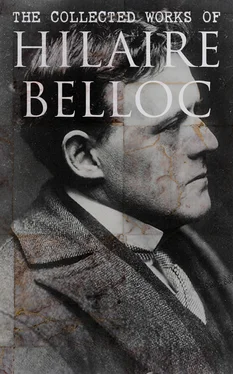When we come to the few trained non-missile infantry of the English forces—some 4000 in the line, not counting the reserve—and contrast them with the rabble of untrained and scattered French countrymen, most of whom were still coming up in the rear and did not take part in the action (save to suffer slaughter in the darkness after it was over), we can take any multiple we choose. They may have been five, six or eight times as numerous as the Welshmen with whom they did not come into contact at all.
It will be seen from the above that the real point of the battle, and that which decided it, was the power of the trained missile infantry of Edward (1) to await a charge of horse in no matter what numerical superiority it might arrive, confident that they could always check it before it reached their line or broke it; and inspired by that confidence, because (2) the only missile infantry that could be brought against them to prepare such a cavalry charge was armed with a weapon which delivered only one shot to their three. That was the deciding element of the Battle of Crécy: the power of the long-bow to stop horse upon any front equivalent to the front of the Archers, and the confidence of the bowman in that power.
* * * * *
The action opened regularly enough with the advance of the French missile infantry, the Genoese mercenaries, at the hour, as I have said, of about five o’clock. They proceeded down the slight slope into the Val aux Clercs, followed at a foot’s pace by a strong body of the first battalion of the French mounted knights under Alençon.
Advancing thus deployed, a body of 6000 men had difficulty in keeping its line, a thing essential to the simultaneous effect of short-range weapons. Twice they were halted to correct their alignment, and though perhaps at the second halt they were at the lowest point of the valley and just in extreme range of the English arrows from the height above, those arrows did not yet come. The English had been ordered to reserve their fire. They began to climb the opposing slope, shouting as was their custom, and after a third halt had been called, and a third strict alignment made so near to the English front as to be certainly in range for their cross-bows, the order to shoot was given. With the first flight of the Genoese bolts, the English Archers took each man his step forward and began pouring in that terrible fire, sustained, accurate, and rapid, to which they were so admirably trained, and of which hitherto, save in the fight at the ford, no example had been given in continental warfare.
Under that murderous and unceasing rain of missiles the Italian mercenaries, whose weapon compelled them to a complicated process of winding and ratcheting and laying, very ill-suited to such a strain, fell into disorder. A sufficient proportion of them broke, and their confusion at once angered and churned up the great body of mounted French knights, which awaited impatiently immediately behind their line. They were ridden down in the eagerness of these armoured horsemen to retrieve this first check by a charge, and Alençon’s men spurred hard (badly hampered by that obstacle of their own men fallen into confusion before them) upon the English right and the Prince of Wales’s battalion. Some of them got home, especially those who found themselves opposite the most advanced section of the Prince of Wales’s command, where it stood thrust forward in a semicircle upon the shoulder and last slopes of the hill. The boy himself was unhorsed, and for a moment the pressure was severe. 15But the effect of the arrow fire upon all the rest of the charging line told heavily. It never got home. Indeed, it must have been apparent to Edward at that moment that for all the fixed tradition of chivalry and that overwhelming atmosphere of military religion which in every age, according to its traditions, confuses the soldier, had he kept all his men at arms in reserve and put Archers only in the front line, they would have sufficed to win his battle.
There stands upon the Crécy end of the ridge a great mound to this day. It is the foundation of an old stone windmill which stood there for centuries, and which has been shamefully pulled down within living memory. From that mill it was that Edward watched the whole action proceeding upon the slope beneath him. He saw the head of the French charge get home but its extended line wavering, checked, and broken up on the Val aux Clercs as a continuous rain of arrows poured in. He saw all the front ranks of horses broken: the animals lashing out or fallen stampeding rearward, mounted or riderless: the heavily armoured knights fallen helpless and trampled, the whole thing a vast confusion.
It was near six o’clock. The westering sun was within an hour of its setting, and shone right up the vale, coming aslant upon the burnished armour of the charge. Had this kind of warfare already established a tradition, and had men learned by experience what unshaken infantry could do against horse, it would already have been apparent that the action was decided. But there was no such experience and no such knowledge. Over the long slopes of open field which fronted the English ridge, line after line of knights were coming forward in successive waves, as though mere weight of horses and men could win home in spite of the increasing welter of flying, dead, and maddened mounts, and of fallen men and iron that now lined all the front with a belt of obstacle more formidable than earth or wall. And of those, such few as could struggle through to within range might hope to escape the deadly and now converging fire which struck horse after horse as the foot of the ridge was reached. By gaps in the deadly confusion of the stampede and the corpses, round to their right further and further up the valley (upon their left the marshes of the Maye forbade a turning movement), the French charges followed and spread. A dozen or more were counted, and each as it came met the missile defence and was broken, with no counter missile offensive to tame that fire.
The sun was setting, but one effort was made which should have been made far earlier in the short crisis. It was an effort of the French right to turn the English left by Wadicourt.
Due, we may imagine, to no regular order, an occasion seized upon by some one commander who saw his chance, a charge of horse was led right up to that end of the English line, the barricade of wagons prevented its getting home, and, though the struggle was violent, the obstacle was never pierced or overcome. Well after sunset, and as the light was fading, the King of France himself led a great body to the centre, and seems to have come into range of the arrows, but he, no more than any of his lieges, could force horse against steady infantry and an unremitting fire. The darkness came, the late moon rose, and still were desultory and sporadic charges continued, haphazard and blindly. They had not even a hazard of success. These last efforts of the failing battle were repelled with ease, but even up to midnight the final pulses of the fight throbbed, with lesser and lesser pulsations; until after these seven hours of it—most of it by darkness, and all the while the line of Archers standing unbroken, and all the while supplied with their unexhausted ammunition, and finding strength to draw and to discharge—the thing was over.
Throughout that night great bodies of disordered peasantry, half-armed, the militia of the Communes, fled or wandered aimlessly southward over the bare, rolling land. The mounted knights had ridden away from a field where all was utterly lost, and the English line broke up to move forward by the light of lanterns over the face of the countryside, to despatch or to capture the wounded, to loot, to search for the faces and the ensigns of the greater dead. But in that darkness the magnitude of the result was not seen. The English army seems to have guessed the issue mainly by the dying down of the noise, and the ceasing of the cries of men rallying to their lords’ banners.
Читать дальше












